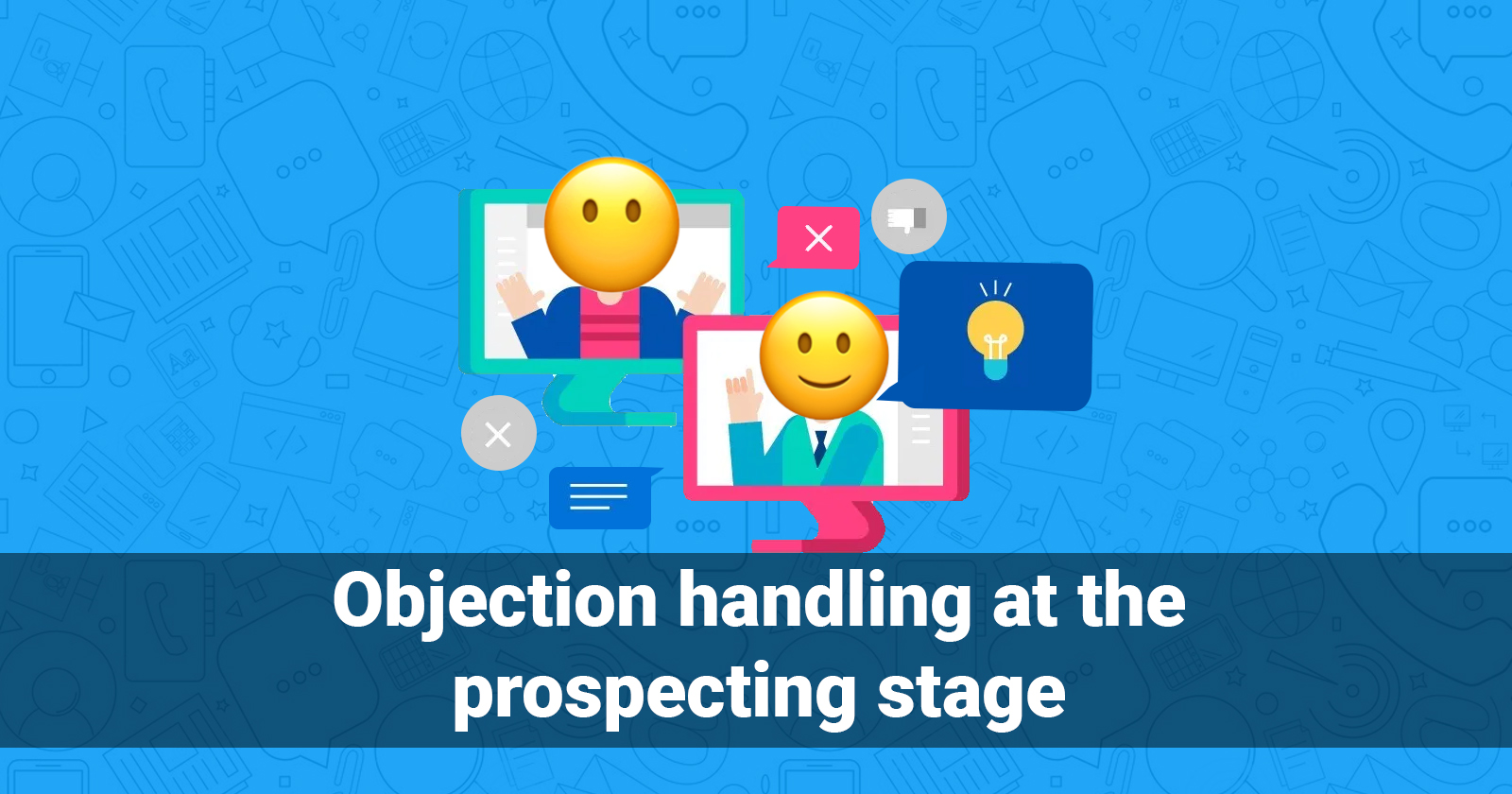
In this article, we take a look at common sales objections, specifically at the early stages of the deal – the prospecting stage.
Types of objections
First thing’s first.
It is helpful to understand what the common types of objections early-stage clients might have.
In general, they can be bucketed into for categories relating to budget, trust, need and urgency.
No budget; too expensive…
This objection is arguably the one you will come across the most frequently.
One way to handle such, is to angle the conversation around the value of a particular policy in times of need. This might help change the balance from expensive vs cheap to one about risk vs. reward.
Why should I trust or listen to you…
While sales reps of established companies tend to not have to deal with this objection, insurance intermediaries might face this a little more.
At the end of the day, the client is judging the intermediary as much as the policy (and insurer) they are representing – the intermediary is seen to be an advisor.
It is important to not be shy about sharing your experience or case studies where you have successfully helped other similar clients in the insurance purchase journey.
Remember, you can do so, not only on the call or f2f meeting, but also follow-up after, by sharing these (it could be your personal website, a presentation deck or past articles you have shared); it will legitimise what you have said and make them more tangible.
I don’t really see how this can help…
On the surface, this might seem like an objection.
However, this can actually be an opportunity for you to share more information or suss out more information about the client’s needs.
Use open-ended questions to uncover what this is and be sure to evaluate the information gotten. If you find a fit between the need and your services… leverage it to demonstrate value!
This isn’t really something I need right now…
If there really is not an urgent need on the part of the client, then sometimes, the intermediary has to accept it and hold off.
However, it is important to identify if timing IS actually the issue.
—
So, getting to the core of this article…
In what shape or form do these objections come in?
More importantly, how do you overcome them?
Here are some of the more common ones that we sussed out and some ideas on how you can overcome them!
Don’t be surprised if some of these objections sound familiar – you might unknowingly have used them before as well!
Common objections and how to handle them
‘Okay, email me the info. I will read it later and get back to you.’
This is kind of like a ‘brush off’. Especially if it comes, before you have had the chance to share your services and value.
If it comes after, then there may be interest, but the client might not yet be willing to talk further.
Regardless, it is still important to at least understand what is really going on.
Do they not yet understand the value, or are they not ready for a buying conversation? Why not?
Depending on the stage of the call, here are a couple of suggested responses you can try…
- Before sharing your value
‘Can I take a quick 30 seconds to explain how I can help, and you can then decide if it is worth a follow-up?’ - Before you were able to ask a couple of questions to understand the client’s needs
‘Can I ask a couple of quick questions now to better understand how I might be able to help?’ - After asking a couple of questions
‘Are you open to share with me your actual requirements so I can start sourcing for quotes on your behalf?’
‘Call me back in X weeks.’
While it is always easy for a client to push things back – it is always the case right> I am swamped today, so let me just push this back to tomorrow.
You should try your best not to allow that to happen!
If you are already in talks with the client, even at an early stage, it means you potentially provide the service or advice they needed YESTERDAY!
Let the client know that the current conversation is not about buying. For example…
“If it is really bad timing right now, let’s reschedule. However, I would still like to set up a quick call to share or understand how I might be able to help. That way, if we both realise that my expertise does not match your needs, we don’t have to worry about me chasing you in X weeks, but if it does, I can already start sourcing for quotes on your behalf and we’ll have more to talk about then, When is a good day/time for us to chat?”
‘But this does not help me if X, Y, Z happens…’
Like the ‘I don’t really see how this can help…’ type objection, this is actually not so much an objection rather than one step to getting them to the next appointment where you can present more ‘meat’.
This generally means that your client is interested and if you feel you have enough information on hand, specifically for insurance intermediaries, you can actually suggest that in your next call or meeting with the client that you will be ready to present them with a couple of quotes to discuss!
‘Sorry. I am busy right now. I will call you back.’
What can be worse than this right?
Generally, people try to avoid saying ‘No’ outrightly.
If the client is really not interested, now is the time to find out if that really is the case.
You want to call out their lack of interest and get them to admit that the answer is ‘No’.
Of course, be nice about it lah. Not poking them with a ‘if no just tell me no. don’t waste my time.’ kind of response.
An example could be along the lines of ‘Typically, when a client tells me this, it really means that they have no interest. I would really like to share more with you but please do let me know if this is not worth your time.’
Do follow up by suggesting that you can actually start sourcing for quotes on their behalf and the client can decide whether it is worth their time or not then.
—
Keep clients warm by offering to source for quotes, even at the prospecting stage
While the above are some verbal ways of which we hope can help, for insurance intermediaries specifically, here at Surer, we feel there’s no better way to do so than to be able to tell the client…
Why not let me know your requirements in general and I will source the quotes for you. You can then decide after having a view of your options. No obligations at this point though
As alluded to in some of the suggested responses above, we really do feel this is a good way to get the client interested while not feel entirely obligated.
We do understand that sourcing for a quote can be a painful and tedious process traditionally.
So, it is entirely understandable that an intermediary will not move to this step, unless they are pretty sure their clients are up for the purchase.
However, with Surer, intermediaries can save 95% of their time quote sourcing because we have streamlined and automated this process.
Not only does it save time. The effort required is as good as sourcing for ONE quote.
Intermediaries can now leverage Surer to not only close deals, but to serve their clients better, even at the prospecting stage.
Essentially, you are doing the legwork on behalf of your clients, but with a supercharged system.
This gives you the ability to say what we quoted above without worry that it might be hard to back it up!
—
Of course, as in life, most things are easier said than done.
We understand that the life of an insurance intermediary is not as simple as reading an article, applying the learnings and then magically, everything works out.
We also understand that at times, a no from a client means a no.
However, here at Surer, we sincerely believe that these articles and Surer itself can harness the power of technology to help insurance intermediaries gain that advantage and help you pitch better and close faster!
Find out more about this topic at our upcoming webinar!
This topic will be one that will be covered in more details at our upcoming webinar. Find out more about the webinar or RSVP directly via the form below now!
Webinar Details
- Date: 2 July 2021, Friday
- Time: 10.30am – 12.30pm
- Venue: Zoom
This webinar is free and open to all insurance intermediaries who are interested in the topic, so please feel free to share this with your peers and network!
Are you an Insurance intermediary? Sign up for free now!
It is fuss-free. No credit card or payment required.
